Basrah, Mesopotamia
March 14, 1920
General Nepean’s Headquarters
River Command, General Headquarters,
Basrah, Mesopotamia
My dear little family—
It is now nearly a month since I have heard from home. I wired the American Consul at Baghdad as soon as I could reach a telegraph office, asking him to forward everything here, but nothing has come. I am hoping for better luck tomorrow, for tomorrow night is likely to see us off on our Babylonian caravan.
A few minutes after I had put in the last paragraph in my steamer letter of last Wednesday, the 9th, the chief of staff from General Headquarters came on board the ship to call on me and bring me a cordial letter from Major-General Hambro in Baghdad. He brought me also a hearty invitation from General Nepean, his immediate chief to be his guest at General Headquarters. The General has charge of the River Command, which extends from the Persian Gulf up both sides of the river (Shatt el-Arab) to Amarah. His Chief of Staff, Lieutenant-Colonel Venning, also informed me that a launch would presently come along side for all our kit and for the other members of the party, who would be taken to the hotel, conducted by the military, and at the same time he asked me to go with him to headquarters in a car waiting on the dock, which would be put at my disposal with its native driver for the duration of our visit in Basrah. A very few minutes altered the complexion of our situation essentially.
We were presently bowling down a concrete automobile road between miles of palm trees, among which appeared myriads of military, administration and stores buildings, with an enormous radio installation towering over everything. It all stretched on for miles. We crossed bridges and canals, we wound around parked ammunition and stores, we passed innumerable hieroglyphic signs in black paint on white boards, like C.O.O. or N.A.C.B., etc., etc., etc., each marking one of the myriad wheels within wheels in this huge administrative machine which keeps this great addition to the British Empire properly going, and defends it from the hostile Arab communities still making themselves as dangerous and obnoxious as they dare. It was a rapid drive of half an hour, carrying us through various military quarters bearing the names of Arab villages now completely effaced, but once distributed far and wide over the palm-grown plain all around Basrah. The town itself is not on the Shatt el-Arab, but straggles along the banks of a creek known from a village beside it as Ashar Creek. Then there is Margil, and Makina, the site of an old native licorice factory (hence Makina = machina), Magil, Ashar village, etc., etc., etc., all now military areas bearing these names, and enveloping old Basrah in a great fringe miles and miles in width, with military roads winding among and through them. It is amazing what has happened here in a few years! Immaculate fire stations, drinking water supply stations, public sanitary stations, carefully arranged and duly labeled public latrines, postal stations, telephone stations, telegraph offices, electric light and power plants, bridge and road repair departments, steam-rollers at work, all these and scores of other evidences of an efficient and enlightened public service, fill one with wonder and admiration.
We rolled up in front of an oriental buff brick building with many oriental awnings, facing a pleasant prospect on the river, and here Colonel Venning took me in and showed me to a large room, with native bath room alongside. He told me that the General was absent on a tour of inspection and would be returning the next day. Meantime I would probably find it pleasanter to take my meals in the staff mess which was directly across the corridor from my room.
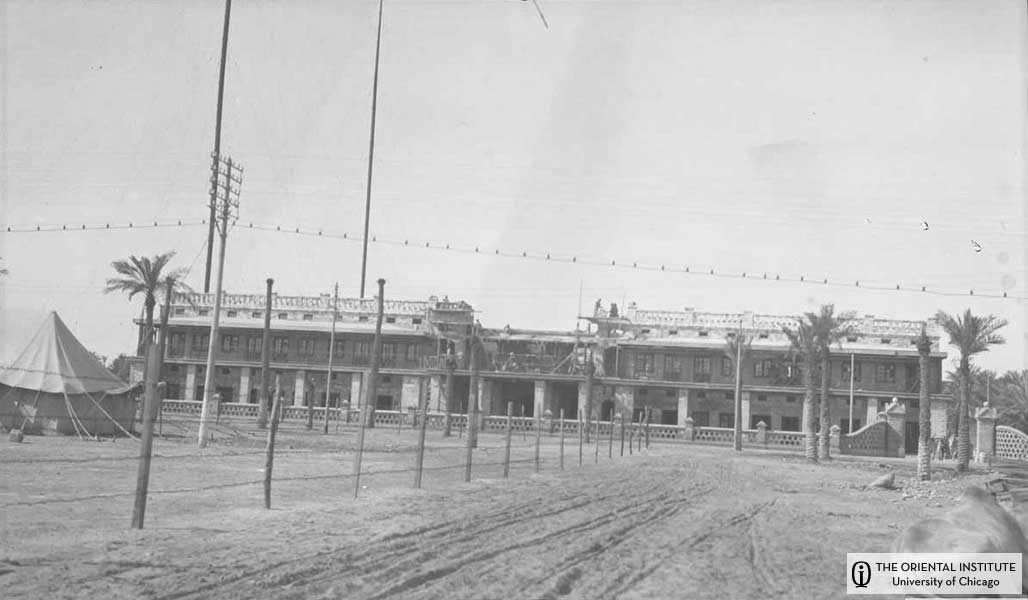 Basra: Hotel, conducted by military authorities, where the Oriental Institute party stayed. (N. 3456, P. 7016)
Basra: Hotel, conducted by military authorities, where the Oriental Institute party stayed. (N. 3456, P. 7016)
He then showed me a file of papers, dispatches and orders concerning our expedition and the arrangements for our advance from here to Baghdad. Everything was to be done for us, and permission to visit the first ruins awaiting us at the south end of Babylonia, and arrangements for much of the trip, were already on hand.
I had asked Luckenbill to come along with me in the car, and the young officers of the Staff asked him to come in to lunch also. In their mess room hung a large autographed engraving of the Kaiser in hunting costume. You have seen it often in Berlin. The young men then told us, in response to my expression of surprise, that we were sitting in the German Consulate. All the furniture and oriental carpets had been the property of the German government! So I am sitting in a German chair at the moment, writing at a German table, and I sleep in a German bed!
Wednesday afternoon I began at once the task of arranging for caravan life. You know what that means. We would have been utterly helpless, in view of the huge extent of this place, if I had not been supplied with a car. All stores are classified by kinds. Tents are in one place, oil-stoves in another, field candle-sticks somewhere else, table ware and kitchen canteen miles away in another depot; beds, chairs and camp furniture in the officers’ store, provisions in a canteen; rations in a supply depot; and so on for everything. It takes a half hour’s fast driving to reach the Chief Ordnance Officer, or C. O. O. as he is commonly called. I spent an hour driving about trying to find the American Consular Agent the second day, and we have only now succeeded in finding out where he is in this huge pigs-in-clover puzzle. Our difficulties are enhanced by the fact the driver is a turbaned East Indian who knows almost no English, and we have great difficulty in making him understand which of these many places we want to reach. Yesterday, when we were trying to reach G Group in the Ordnance Depots, we found we had been driven many fruitless miles to the Dairy Depot! However I am glad to say that everything has at last been found except one additional tent, which will come tomorrow. The Chief Ordnance Officer reported that he had orders to send all his oil stoves to Baghdad for the use of officers’ families there, and that if he gave us one he would be disobeying orders. I got the matter before the General, and he at once gave orders to deliver us a stove. Many such snags have arisen, but they have always been surmountable with patience and diplomacy.
The next morning following our arrival at General Headquarters the Chief of Staff (Lieutenant-Colonel Venning) came in and told me the General had just arrived and would like to see me. He gave me a most cordial reception and said he was sorry he did not have the accommodations to take in the rest of the party. I brought up the chief difficulties confronting us, and he assured me of assistance in every particular, and as you see above, he has fully kept his word. I then shifted over from the Staff Mess to the general’s table, where we have very pleasant meals, and excellent cooking with only the general and young Captain Corry, his aide-de-camp, beside myself at the table. The general is a fine old fashioned British soldier from the Indian service, a very kindly and upright gentleman, most solicitous for the welfare and comfort of everyone in his command. He goes to service twice on Sunday, he visits the sick in the hospitals, he looks after the young English women who are out here as nurses, and leaves nobody neglected. It was pleasant to see him at the table looking out of the window as three English nurses passed, and saying, “I say, Corry, those girls all have their topees on, haven’t they?” The East Indians call a sun-helmet a topee, and the general had issued a circular order that all nurses should wear them when going out, owing to the danger of heat prostration which is so generally neglected by new-comers, with disastrous results.
The general loves to see his people having the right kind of a good time. Charles would be interested to see him at this kind of thing. Yesterday afternoon (Saturday) the stores and depots were all closed, so when the general asked me if I would go with him to a hospital concert, I accepted the invitation. We went on the river. The general has a whole fleet of launches. One of them was placed at my disposal when needed. His own launch is a beauty, an American pleasure launch, a fifty-footer which does twenty miles an hour, three miles to the gallon. The general is very fond of it. We crossed the river and went up a canal to a hospital where Corry sprang out and presently returned with a pleasant young nurse who had just come out and the general wanted to give her a good time. We then returned past the whole long water front — miles of buildings and depots — to the nurses’ quarters, where we had tea. At five we adjourned to a large auditorium, where the convalescents were gathered, even a row of cots along in front of the front row of seats. The programme was furnished by officers, their wives, and the nurses. Corry was first. He has a fine voice which he uses very well indeed, and his singing was very pleasing. I was very tired but I used the hour for rest, and found it intensely interesting.
Then we took the launch back to General Headquarters, the general going to the nurse in charge and asking leave for two more of the nurses besides the one we had brought. So we came back with three nurses, and the general’s butler had a fine dinner ready for us six, spread in his private dining room. Officers do not of course have to change their rig for dinner, and I had only a quarter of an hour to change mine and get into a dinner coat, without having a bath. After dinner cars were waiting for us and we drove out through the palms in the star-light, to a really very nice camp theater, built by London mechanics, a scene painter etc., etc., who were out here in the ranks during the campaign. You should see the chase brass appliqué designs up and down the pleasing pilasters of the proscenium,—brass work made out of Turkish shell cases by Tommies who were metal workers. The whole thing was a voluntary labor of love by boys now long since demobilized, or lying in military cemeteries all up and down the Tigris. The programme was as follows:
I. VAU DE VILLE
Four numbers
II. A CURTAIN RAISER
“A Dear Little Wife”
III. VAU DE VILLE
Four numbers, one a very pretty dream fancy.
IV. A COMEDY IN ONE ACT
“Browne with an E”
The performance was a dress rehearsal, the last rehearsal before the four presentations of the play next week. All the people were officers and their wives. They had a royal good time, and with one or two exceptions their acting was good. The general had charge of the comedy, and he took his job very seriously, going in to inspect the make-up, looking after properties to see if his instructions had been properly carried out, and when the post coach arrived at the Alpine inn, the general was in the flies giving the cue to his Indian bugler to blow a flourish at exactly the right moment. A surgeon’s wife was doing the American girl, and the General asked me to be sure and give her all the points I could as to American slang and accent! It was all very amusing.
After the play was over, there was of course whiskey and soda, and none of the men let it pass. It was eleven when we started back to General Headquarters. Corry took two of the nurses back in his car, and the one from across the river went with the general and me to General Headquarters, where the launch was waiting. The general insisted on seeing her back to the hospital dock, and sent me off to bed. A half hour later I heard a loud crash down by the dock, immediately in front of General Headquarters, and a lot of native shouting. This morning at breakfast the general told me that a native boat in violation of harbor rules was going along without lights and they ran into her, much as we did years ago in Mr. Farr’s launch. The general’s launch did not spring a leak, but the bow is stove in, his fine new American launch, which it is difficult to repair out here! Without the slightest irritation in his voice, the general casually remarked, “I think we shall have to punish him for violation of harbor rules, you know. We have taken his number”. One of the interesting things for me at the play was the native East Indian Band. The colonel of the regiment to which it belonged told me his regiment was 120 years old, and that the band was made up entirely of “line boys”, the sons of old members of the regiment, who are received as mere children into the service of the regiment, are drilled and instructed, and made regimental orderlies, and receive some two-thirds as much pay as their fathers. You can understand, under these circumstances, the loyalty of the Indian regiments in this war. These Indian troops have had a lot to do with the conquest of the region we are going through. The authorities insist that we shall not go anywhere without an escort. It will sometimes be made up of shabana, or native Arab police, who are already very smart and keen on their job. Again, we shall be accompanied by Indian troops, from just such regiments as I have mentioned.
I begin to feel very much at home in these quarters. The office of the Chief of Staff (Colonel Venning) is next my big bedroom, and he wanders in when he has anything of importance to tell me. He is a very wholesome fellow, with a wife and three children here, whom I have met. They are about to leave him for England, where the children are to be put in school. Captain Corry, the young aide-de-camp is a very attractive fellow. As I told you above, he is musical and loves to sing. He takes charge of musical entertainment for the hospitals. He is much interested in the ancient history of the country. He strolls in whenever he has a moment’s leisure, and likes to talk. We had a very interesting conversation in the general’s car last night. The general loves to drive and so he took the wheel, with the native driver next him, while Corry and I sat behind. We talked of the British Empire and the great responsibility of young Englishmen in carrying it on. He said he thought it was the greatest job a man could do, and that he loved it, as did all the men he knew in India, where he began. I spoke of the sacrifices and Venning’s children. Corry said he thought a man had no right to a family if he undertook the job of maintaining the British Empire on the frontiers. He told me of his attachment — a fine girl in England, of whom he was very fond and she knew it. “But”, he added, “I told her long ago that it is all off. I am going to stay on here the rest of my life, and I am glad to do it”. The general is evidently very fond of him, and when the sedate general was almost overturned by the young aide-de-camp galloping down the stairway of the nurses’ home as he fled from condign punishment at the hands of one of the nurses for some misdemeanor, the old gentleman was hugely amused and was ready to lay a wager that Corry would get caught, which proved to be the case. He likes to see the young couples making their arrangements out here, as they do wherever young people are thrown together. He called my attention to young Major Parrott, one of the steadiest of the Staff, who was walking down to the concert ahead of us, after the tea, absorbed in conversation with one of the nurses. “There”, he said, “I knew Parrott was interested in one of these girls, but I have never seen her before. It’s all right. He’s a fine boy”. One of the Staff, Major Burn, has just come from the hospital with flu. He has made a nice little collection of cylinder seals and similar things, and Luckenbill and I have looked them over. This afternoon Burn came in and handed me notes of a conversation he had just had with Luckenbill, and asked me if I would look them over and see if he had got them right. His interest in it all, when feeling weak and seedy, seemed to me pathetic. Indeed, the lives of these fine young fellows, out here in this God-forsaken region, seem pathetic indeed. It is different from the life of the officer enlisted for the war. They are in it for a lifetime. Corry says it is much better here than on the Afghan-Indian frontier, especially against the Masudis. He told me how his chief on that front had instructed him as a matter of course, always to save one cartridge in his revolver, for himself. To fall into the hands of the Masudis is an indescribably awful fate.
There, I hope I have given you an impression at least, of what it is like here, though it is quite impossible to do more than create an impression. I cannot give you the whole story of our work and programme thus far, and I will wait and give you the story of our march rather than anticipate the real journey with a projected itinerary which is likely to be much altered. Your Philips map will show you the route. We go by train to the vicinity of Nasiriya, getting out directly alongside of ancient Ur, at a station called Ur Junction. Wouldn’t that jar you! Ur Junction! Just imagine it. The military commandant will come down from Nasiriya to meet us there, and bring two Ford vans! We shall motor to the ruined city, and thence to its ancient port, now called Eridu and at least 175 miles from the sea. The modern name is Abu Shahrein, but neither of these places is marked on your map. They are a few miles south of Nasiriyeh. We shall then be furnished with a launch for the trip to Shatra el-Mumtifik and to Duraji, whence we go to neighboring cities now in ruin. We shall then go on to Diwanieh where I hope to receive letters from you, if I do not receive some meantime before we leave here.
Good-bye — It is now 2:40 p.m. and at 4:00 two Ford vans are coming for our stuff. So I must go to my packing and final adjustments for living in a tent. Have no anxiety. We shall be accompanied by a military guard wherever we go, and there are no epidemics. Kiss the children for pater.
Lovingly, J__.
Here are some pictures from touring around Basra:
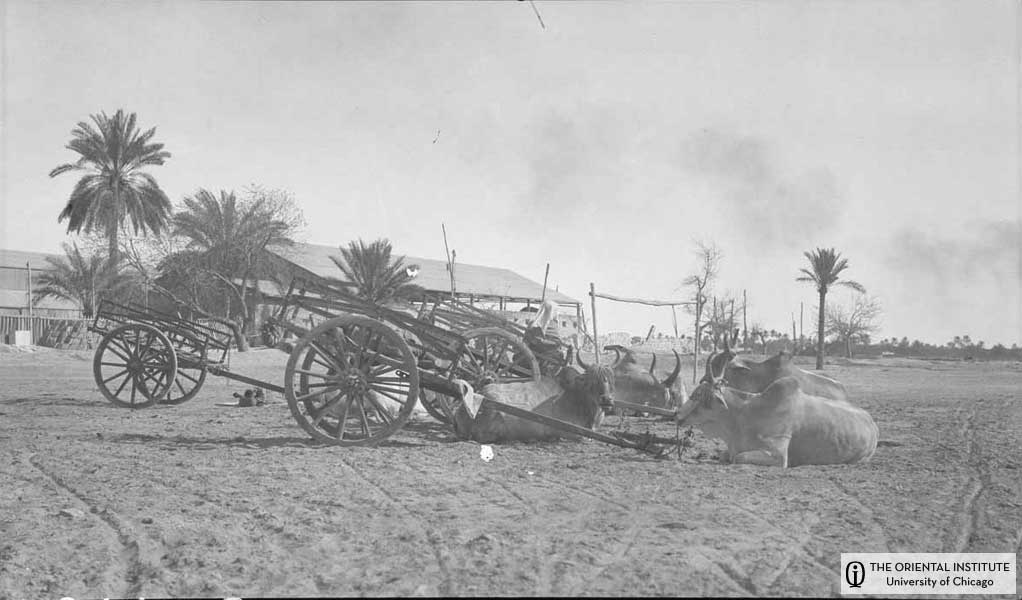 Basra: Indian transport wagons and yaks resting in the sun. (N. 3455, P. 7015)
Basra: Indian transport wagons and yaks resting in the sun. (N. 3455, P. 7015)
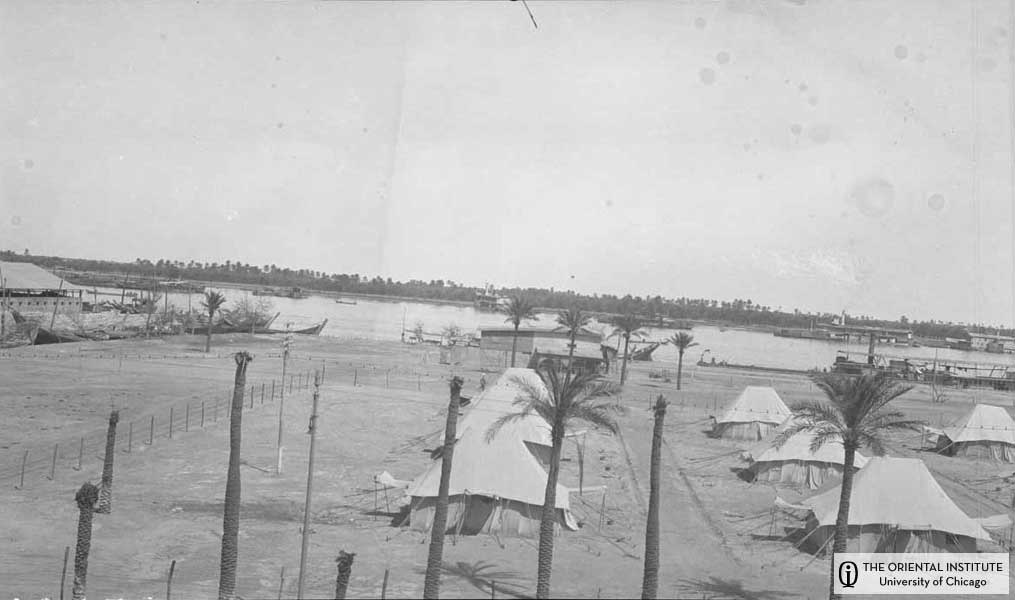 Basra: A view from the hotel roof looking over British tents to ships on Shatt el-Arab. (N. 3458, P. 7018)
Basra: A view from the hotel roof looking over British tents to ships on Shatt el-Arab. (N. 3458, P. 7018)
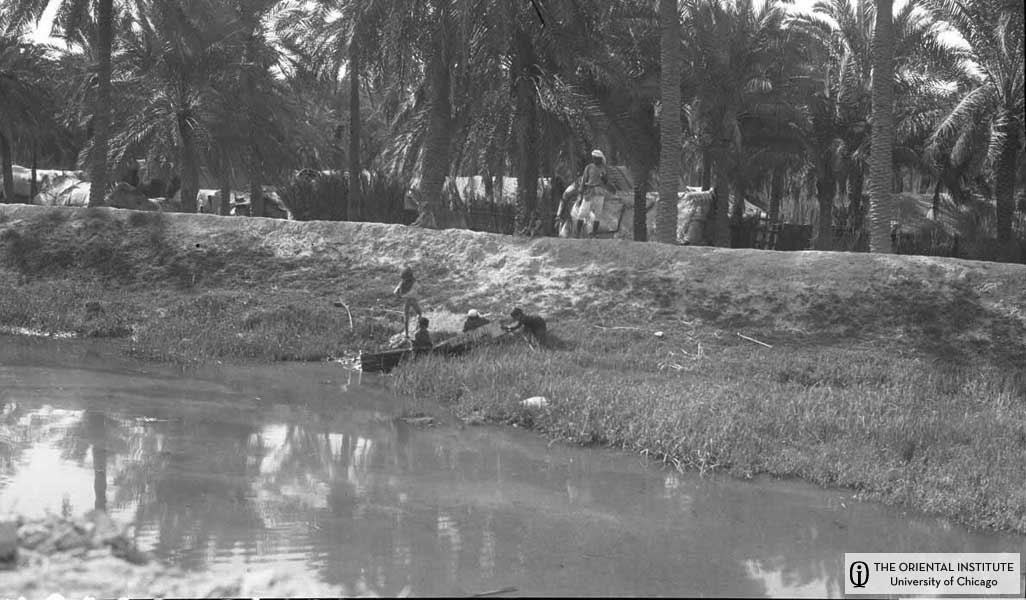 Basra: Children at play on the bank of the river in front of palm grove alongside the hotel. (N. 3460, P. 7020)
Basra: Children at play on the bank of the river in front of palm grove alongside the hotel. (N. 3460, P. 7020)
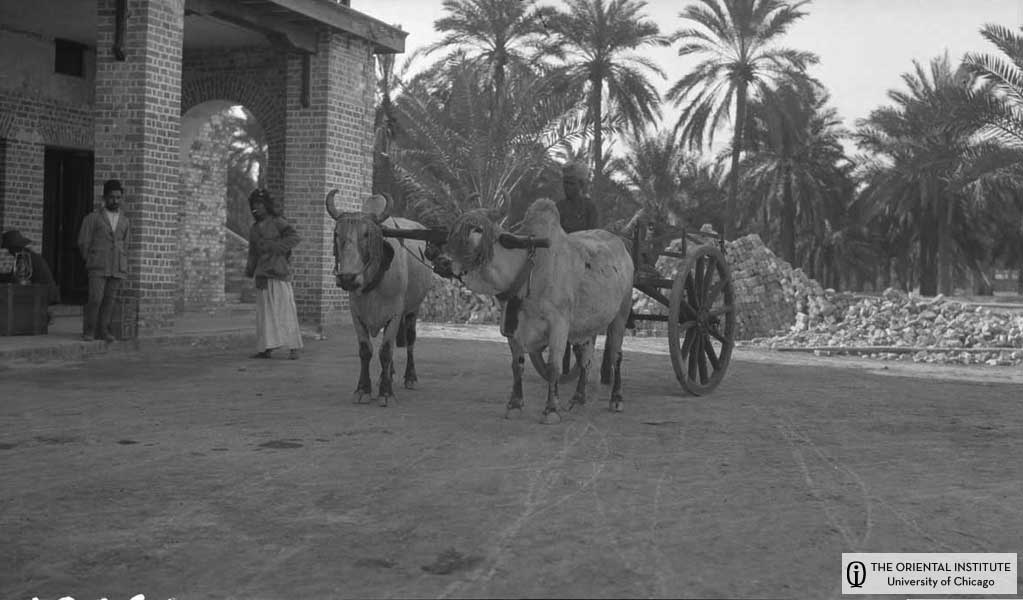 Basra: The Indian transport wagon drawn by yaks in front of the hotel. (N. 3461, P. 7021)
Basra: The Indian transport wagon drawn by yaks in front of the hotel. (N. 3461, P. 7021)
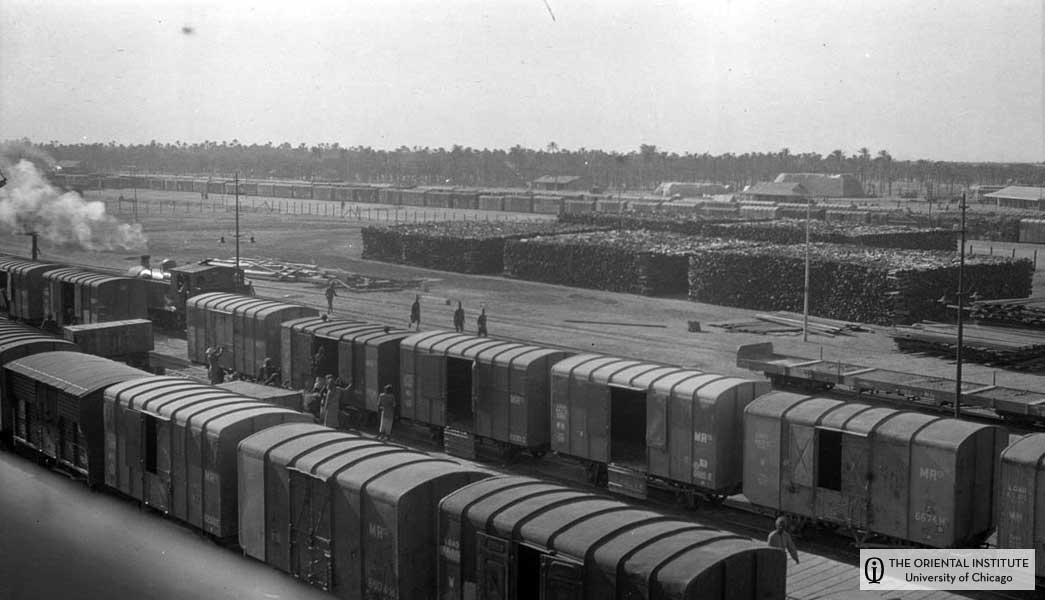 Basra: Piers of the British India steam navigation company. (N. 3724, P. 7284)
Basra: Piers of the British India steam navigation company. (N. 3724, P. 7284)
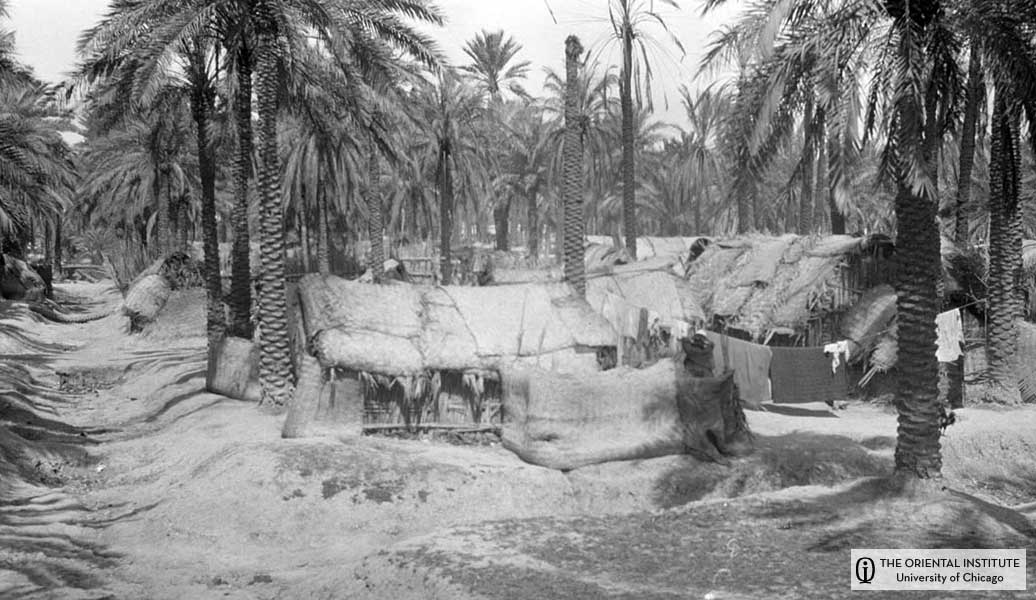 * Basra: Native huts with reed mat roofs in a palm grove. (N. 3726, P. 7286)*
* Basra: Native huts with reed mat roofs in a palm grove. (N. 3726, P. 7286)*
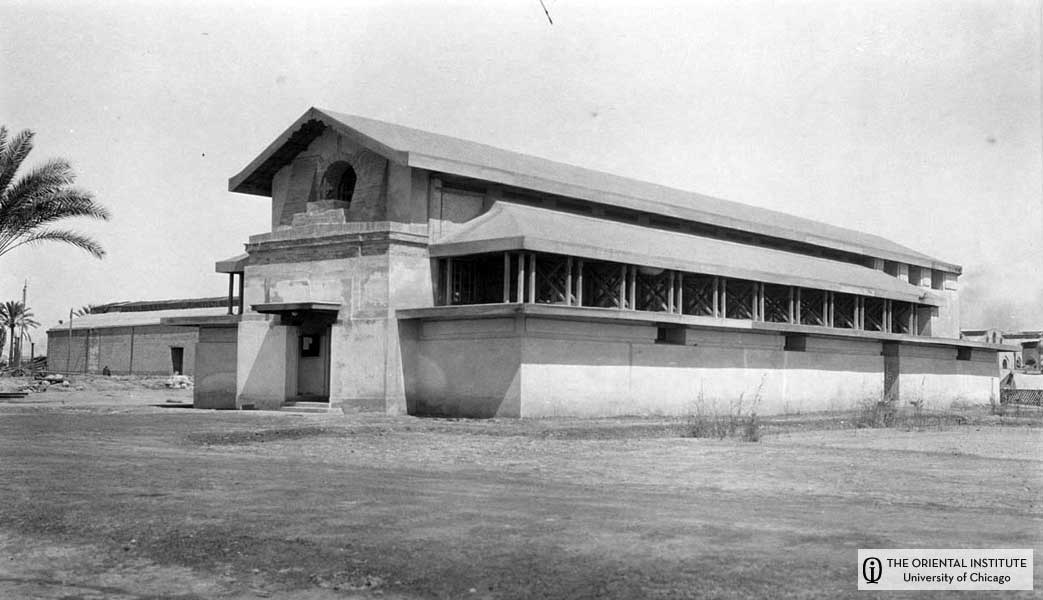 Basra: The church attended by the British garrison. (N. 3728, P. 7288)
Basra: The church attended by the British garrison. (N. 3728, P. 7288)
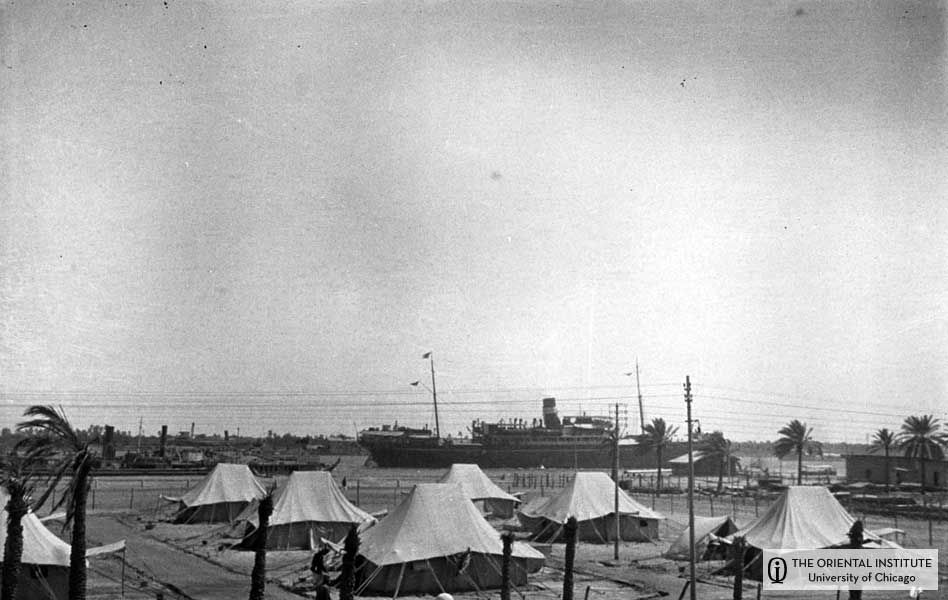 Basra: BISN steamer going down the Shatt el-Arab. March 14, 1920 (N. 44593)
Basra: BISN steamer going down the Shatt el-Arab. March 14, 1920 (N. 44593)
For the full story of my exciting trip you should come to the special exhibit “Pioneers to the Past: American Archaeologists in the Middle East, 1919-1920,” at the Oriental Institute!
1155 East 58th Street Chicago, IL 60637
Hours:
- Tuesday 10:00 am to 6:00 pm
- Wednesday 10:00 am to 8:30 pm
- Thursday 10:00 am to 6:00 pm
- Friday 10:00 am to 6:00 pm
- Saturday 10:00 am to 6:00 pm
- Sunday noon to 6:00 pm
- Closed Mondays
http://oi.uchicago.edu/museum/special/pioneer/
And visit me on facebook at: http://www.facebook.com/profile.php?id=3318774#/profile.php?v=info&ref=profile&id=100000555713577